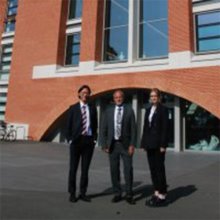Shrewsbury
Launching Shrewsbury Economists Magazine


A brand-new pupil driven Salopian community publication focusing on economics.
To launch the first edition of the magazine please see below an introduction from Mr Nick Zafar, with commentary from pupil Ruby Read (MSH U6), followed by a sample article taken from the publication.
Introductions
“Economics can be a great challenge for students because, unlike many other subjects, they have no prior experience of it. For those with the necessary flair, empathy and, most important of all, an interest in applying their learning to the world, it is an opportunity to shine. These will be the economic ‘movers and shakers’ who will help shape society.
“This magazine was a project to provide a platform for these budding economists to show their excellence and how well they have done just that. Many of the articles in the first issue of ‘Shrewsbury Economists’ would put many a professional economic journalist to shame with the sheer quality of research and comment.
“Well done to all contributors and a special well done to Milton Tai (SH U6) who collated the content with skill and expertise beyond his years, and to Ruby Read (MSH U6) whose talent in designing and organising the final product was exceptional.”
Mr Nick Zafar, September 2020.
If you would like to read the full magazine, please contact Mr Zafar (nnz@) who will be able to send you a digital copy of the magazine.
“I have thoroughly enjoyed generating this magazine. As a new entrant it was daunting being set the challenge of creating something which is yet to be done at Shrewsbury School. Although it was a hard work at times, I have learnt new design skills and mastered unfamiliar software, which I am sure will be valuable to me in the near future. I think it showcases the vast amount of activities to get involved with at Shrewsbury.
“I would like to thank Mr. Zafar, Mrs. Warburg and all the other members of staff involved for making it possible. As well as a big thank you to Milton who has been diligent throughout the whole process.”
Ruby Read (MSH U6), September 2020
Shewsbury Economists Magazine
UK and Hong Kong Article
The Minimum Wage - By Max Cheung
In most parts of the world, the labour market is not a free market. It is usually intervened by the government by introducing a minimum wage. Minimum wage (MW) is the lowest remuneration which employers are legally excepted to pay their workers. This legislation has been introduced by most countries at the end of the 1900s. In the UK, the minimum wage was introduced by the Labour government in 1998, with the rate at £8.72 starting on the 1st April 2020. The Legislative Council of Hong Kong enacted the Minimum Wage Ordinance to set a minimum wage in July 2010, with the current rate at $37.5 HKD (~£3.75). Comparing the two figures, UK workers at minimum wage seem to be much better off, as they are earning more than double of what Hong Kong workers are receiving at minimum wage in nominal terms. However, is this the actual case? In this article we will be discussing whether it is justified to have the current rates of minimum wage by comparing numerous factors of these two countries.
In Hong Kong, a normal worker who is working at MW works an average of 42 hours per week. This gives an annual income of $75,600 HKD (£7,560). This is way below the income tax allowance in Hong Kong.
Hence these workers do not have to pay any tax. Whereas in the UK, an average worker working at MW works around 37.5 hours per week – which is the median of the UK. The worker will, therefore, be earning £15,696 annually. With the UK's income tax allowance at £12,500 and a basic income tax rate of 20%, the worker will be left with a disposable income of £15,056. Although workers in Hong Kong at MW do not have to pay tax, from the statistic above it shows that UK workers at MW, after paying tax, earn about twice as much as Hong Kong workers do at MW. Having said that, UK workers work fewer hours than Hong Kong workers. Is this because the minimum wage in Hong Kong has forced the workers to work for longer hours to fulfil their basic needs? 'Yes' would be the simple answer.
Hong Kong is known to be one of the most densely populated places in the world. It has a population density of 6,659 people per km2. With limited space for housing, the housing price in Hong Kong is the most expensive on our planet. This is further worsened by mainland Chinese immigrating, who raise the housing price even further. The average cost to rent a flat in the UK (£728/month) is more than 2 times cheaper than renting an adequate flat in Hong Kong(£1,743/month). People in the UK working at MW with £1,308 every month will be able to afford shelter. Not such the case in Hong Kong. workers at MW would be earning only £630 per month. This gives them no option but to give up renting an adequate flat and to go for a than 2 times cheaper than renting an adequate flat in Hong Kong(£1,743/month). People in the UK working at MW with £1,308 every month will be able to afford shelter. Not such the case in Hong Kong, workers at MW would be earning only £630 per month. This gives them no option, but to give up renting an adequate flat and to go for a subdivided flat. This type of rental housing is introduced in the housing market to solve a market failure – shortage of housing. Subdivided flats are usually disturbingly poor in quality and unsanitary, yet they are ubiquitous in Hong Kong. Some might argue public housing (council houses) should resolve this problem. However, in both the UK and Hong Kong, there is an excess demand for public housing, creating a shortage. In Hong Kong, it is even being categorised as an 'impossible task' to buy and own an adequate place for living. The average price to buy an apartment in Hong Kong is 5 times as much as the UK's, even if we compare the price of Hong Kong to London, the price in Hong Kong is still doubled. Overall, ceteris paribus, looking at the housing market and supply of housing in both countries and doing a comparison, the statistics show an overwhelming result of how Hong Kong's MW is being set too low in relation to the housing market, which leads to workers working at MW unable to find adequate shelter, thus a low standard of living.
Cost of living is inarguably the most important aspect considered when setting the minimum wage. Cost of living includes the cost for food, transport and shelter (which is mentioned above), which is positively correlated to the price level. The price level is measured by the CPI (Consumer Price Index). Most food-related goods like milk, beef, fruits or bread in Hong Kong are at least double the price of the UK. For example, 1L of milk cost £0.91 in the UK, whereas in Hong Kong, that would have cost £2.22. Food is the most commonly consumed type of goods, as it is essential in everyday life. On the other hand, transport costs in the UK are more than double what they are in Hong Kong. Cost for transport in the UK is more than double of what it is in Hong Kong. Combining these two costs of living, the UK is still cheaper to live in than Hong Kong. The reason for this is that food is regarded as the more significant factor between the two, as it 'weights' more to consumers. Therefore, a higher price for food would affect ordinary consumers greater. As a result, the cost of living in Hong Kong is higher relative to the UK's, linking with the low MW, it is clear to everyone that Hong Kong workers are worse off.
Minimum wage should be related to productivity; as MW increases there should be an incentive for workers to become more productive. Moreover, it would encourage employers to train their workers to become more productive to avoid being eliminated from the market. When productivity increases, MW should be raised to reward and motivate the workers. However, in both the UK and Hong Kong, no pattern of this is seen. In fact, in the UK, labour productivity has barely increased after 2014, averaging an annual increase of 0.3%. Therefore, productivity has only risen by 1.5% over the last 5 years.
However, MW in the UK has increased by more than 30% since 2014. The inability to increase productivity combined with a rise in MW has affected society negatively because this made it harder to lift GDP and impose higher wages for ordinary workers. This lowers the standards of living as a whole for society. In contrast, Hong Kong has achieved an annual increase of around 2% in productivity since 2014, giving an overall rise of 9.5% for the past 5 years. Although the MW in Hong Kong has been raised, it is nowhere near the 30% which UK workers enjoy. Hong Kong's MW only rose by 15% over the past 5 years. The increase in productivity has allowed wages for ordinary employees to go up. This would lead to an upsurge in consumption, causing an increase in aggregate demand and pushing up the price level. Therefore, workers at MW – fixed income – will be worse off.
Inflation is a sustainable increase in the price level. Inflation rate in Hong Kong has averaged 3.3% for the past 10 years, while the UK has been close to its trend at 2% inflation with its current rate at 1.8%. As the UK government has announced an increase in MW by 6.2% to £8.72, UK workers will, therefore, receive a pay rise which is quadruple the inflation rate. This is known as a rise in real income; thus, the employees are better off. In 2019, Hong Kong had saw its MW rise by 8.7% to $37.5 HKD (£3.75) which beats the inflation rate, Unlike in 2017, where MW trailed behind inflation by 0.1%. An increase in MW would lead to higher purchasing power, hence create demand-pull inflation. In Hong Kong, the inflation rate was expected to rise by 0.1%, meaning workers would have an 8.6% rise.
Putting income aside, welfare benefits can create a huge impact on low-income households. To claim benefits – universal credit – in the UK, workers have to be working under 16 hours a week. Therefore, a normal worker at MW who works the average number of hours in the UK will not be entitled to claim the benefits. In contrast, the Comprehensive Social Security Assistance scheme is a welfare programme in Hong Kong which provides supplementary payments to low-income households. These households usually work at the MW and find it difficult to meet their basic needs. The scheme ensures an extra $32,000 HKD annually. Since the Hong Kong government spends more on benefits, Hong Kong employees will be able to take advantage of this. Having said that, this wouldn't necessarily close the gap of living standards between British workers and Hong Kong workers, even though this is a good policy to minimise the governmental interference with the labour market and simultaneously subsidise these low-income households.
Alongside the monetary factors, health care and crime will play a part in determining standards. The health care services in both Hong Kong and the UK are two of the best in the world, as they are affordable by normal citizens and guaranteed high-quality service. The only downside is the long waiting times. The crime rate in Hong Kong is 3.2%, whereas in the UK the rate is 9.5%. Therefore, in terms of crime rate, Hong Kong workers will be better off. The minimum wage is not favoured by free-market economists as they believe minimum wage can cause a rise in unemployment. However, the unemployment rates are 3.4% and 3.8% in Hong Kong and the UK respectively. Although unemployment rates have been low, this has neglected the problem of underemployment. In the UK, more than 14% of employees working part-time would wish to work full-time. This is the case because when wage levels go up, firms lower their cost of production not by cutting back labour, instead by reducing the working hours of employees. This can be used to justify the reason for not increasing the MW immensely.
Minimum wage – price floor of the labour market – is introduced to protect workers from exploitation in work. Also, it is used to ensure workers’ basic needs are met. In the UK, the level of the minimum wage is justifiable as it provides employees with a decent standard of living. Along with this it will not shock the market and cause mass unemployment. On the other hand, lots of workers at MW in Hong Kong struggle to fulfil their daily requirements. Although they are subsidised by the government, it has only contributed trivial effects on improving their lives. A reason for this is the MW is only altered once every two years, therefore, workers at MW will experience a fall in real income in the year in-between the adjustment due to inflation. Overall, MW in Hong Kong seems unreasonable. However, it could be justified, because a massive increase in MW will trigger an increase in unemployment, especially for inexperienced teenagers and workers with a disability. Hence employees will be worse off because of the scheme which is supposed to be used for protecting their rights.
To conclude, it is indubitable that the minimum wage has improved people's living standards, compared with the times without it. Since the policy acted as an incentive to work, it has led to economic growth. Therefore, higher quality products are produced, giving a better standard of living for ordinary people. Conversely, an introduction of a minimum wage has raised price levels, as firms decide to place their burden (cost of production) on the consumers instead. Furthermore, the long-run aggregate supply will not grow, because firms will be less willing to employ inexperienced workers and train them. As importantly, the flexibility of the labour market has reduced due to minimum wage. This lowers the competitiveness of the economy as a whole. Although there are negative effects of the minimum wage, I believe it is essential for the economy. The minimum wage in Hong Kong is unjustifiable as it does not ensure the basic needs of workers are being met. Although some might argue a greater increase in minimum wage will cause unemployment, this is not true, as this pay rise is only suitable for workers at minimum wage. These workers work in lowskilled jobs. In Hong Kong, there is inelastic demand for low-skilled workers as more and more people graduate at the university level, fewer lowskilled workers are available in the market. As a result, the minimum wage should be raised higher to reduce poverty and close the inequity of wealth in Hong Kong. Additionally, unemployment caused by a higher minimum wage will be outweighed by the long-term benefits of a minimum wage, as a higher level of minimum wage will act as a strong incentive to raise productivity. Once productivity is raised, sustained economic growth will be achieved, therefore more jobs will be created. Hence the whole of society will be better off.












.png&command_2=resize&height_2=85)




.JPG&command_2=resize&height_2=85)



